- Synopsis
- PITCH DECK
- Director's Statement
- Endorsements
- MEDIA COVERAGE
- EMail signup
- EVENTS
- CONTACT
- NEED A SPEAKER?
The Liberty at Stake mini-documentary premiered on Monday, July 15, 2025 in the beautiful, historic Miller High Life Theatre. The production of a full-length film is currently underway. Watch here.
Academy Award-winning filmmaker John Ridley interviews Michael Jahr as part of the Emerging Filmmaker series.
View our pitch deck to learn more about this ongoing project.
In this episode of Our American Stories, Michael Jahr, producer and director of Liberty at Stake: The Joshua Glover Story, and Dr. Robert Baker, author of The Rescue of Joshua Glover, share the powerful, forgotten story of fugitive slave Joshua Glover and how his escape, arrest and rescue set in motion history-altering events.
Logline
When authorities arrested fugitive slave Joshua Glover in 1854, some 5,000 of his Wisconsin neighbors rallied to his aid, breaking down the jail door and escorting him to freedom. Their efforts set in motion a series of events with historic consequences, ultimately leading to slavery’s demise.
Synopsis
In 1852, Joshua Glover made a daring decision that would change his life. He determined to escape from the St. Louis farm where he was enslaved and seek freedom in the North.He could not have known that his decision would also alter American history.Glover’s journey would lead him nearly 400 miles to Racine, Wis., where he was welcomed by the abolitionist community. He found work at a sawmill and a place to live. For two years, he reveled in his newfound freedom.Slave owner Benammi Garland, however, was determined to reclaim his missing “property,” offering a $200 reward to anyone who found Glover. By early 1854, the slave catchers had located him.Garland traveled to the Milwaukee courthouse and secured a warrant for Glover’s arrest. A posse, which included two deputy U.S. marshals, was assembled. On the wintry night of March 10, the party traveled to Racine and knocked on Glover’s door. When it was opened, they rushed in.
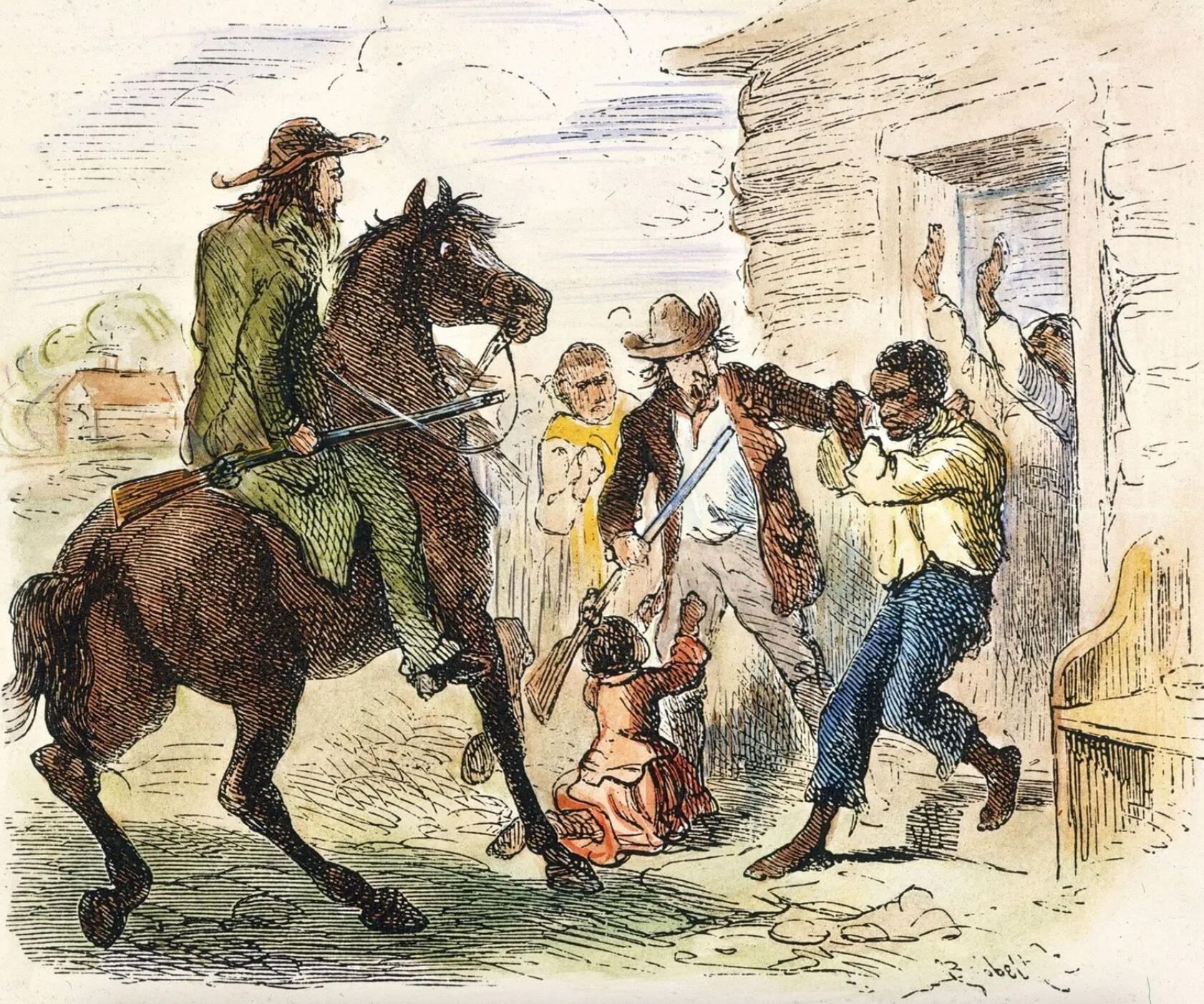
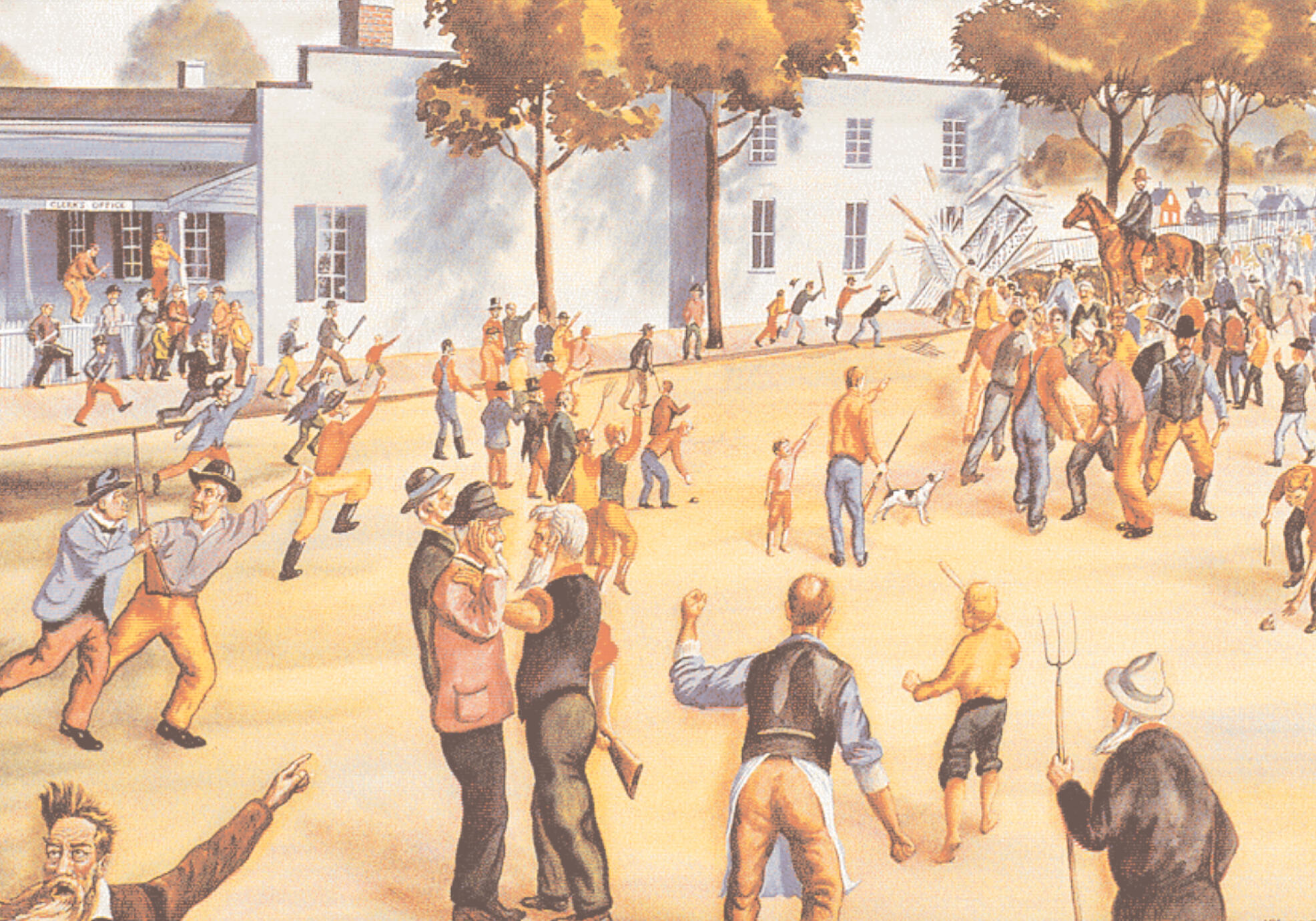
Glover, shocked by this invasion, resisted his assailants. He was knocked to the ground, bleeding from a severe head wound. The marshals forced Glover outside and shoved him to the floor of a horse-drawn wagon, bound for Milwaukee. There, he was thrown into a cell, forced to contemplate the heartbreaking prospect of a return to a life in bondage.Word of his abduction spread quickly through Racine the next morning, triggering a protest rally in the town square. At the same time, a Racine abolitionist sent a telegram to Milwaukee newspaper editor Sherman Booth, notifying him of Glover’s incarceration. The fiery abolitionist mounted a horse and rode through the streets like Paul Revere, calling on residents to gather at the courthouse. “A man’s liberty is at stake,” he cried as he rallied his neighbors.Some 5,000 people showed up.
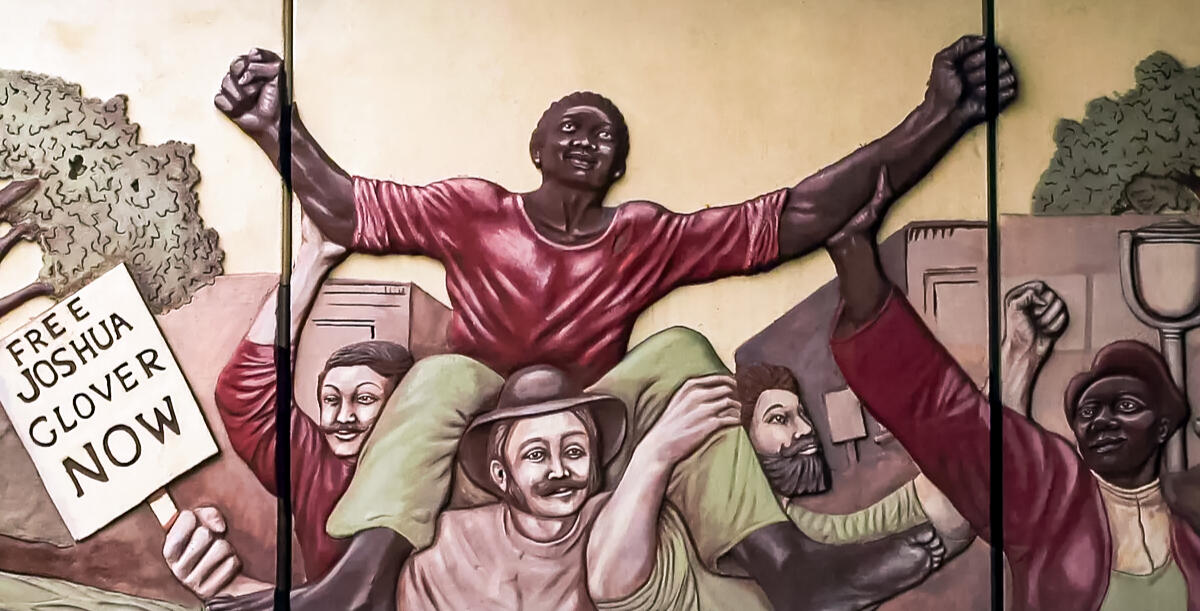
Initially, the gathering was orderly. A president was elected, committees were established, resolutions adopted and speeches delivered – all insisting that Glover be afforded due process and released. It soon became clear, however, that officials had no intention of releasing Glover – an option forbidden by the Fugitive Slave Act of 1850.So, the protesters switched tactics.They borrowed a beam from a construction site, battered down the courthouse door, overwhelmed the guards and broke the fugitive out of his cell. He was whisked away in a waiting carriage and, over the next few weeks, hidden along the Underground Railroad while Garland and law enforcement officials searched in vain. Glover was eventually smuggled onto a ship that bound for Canada. There, he lived the rest of his long life in freedom.But the story doesn’t end there. On March 20, just nine days after Glover’s rescue, a group of about 50 abolitionists gathered at a schoolhouse in Ripon, Wisconsin. These Democrats, Whigs and Free Soil Party members were animated by one objective: the creation a new political party united in opposition to slavery. They came out of the meeting calling themselves “Republicans.”The formation of this new party, its early successes and the eventual nomination of Abraham Lincoln as its standard-bearer would exacerbate relations between North and South. Southerners were further outraged when, during the court battle over the actions of Sherman Booth, the Wisconsin Supreme Court declared the Fugitive Slave Act unconstitutional.Liberty at Stake will present this remarkable story beginning with the purchase of Joshua Glover by Garland in St. Louis on Jan. 1, 1850. The film will follow Glover’s daring escape two years later and his new life in Racine.Scholars and authors will describe the political and cultural climate of the 1850s and how they contributed to the chaotic, inspiring events of March 1854. Experts will offer insights into Glover’s travels along the Underground Railroad and detail his new life in a community just outside Toronto.The film will recount these and related events that culminated in the election of Lincoln, Southern secession, Civil War and, ultimately, emancipation.
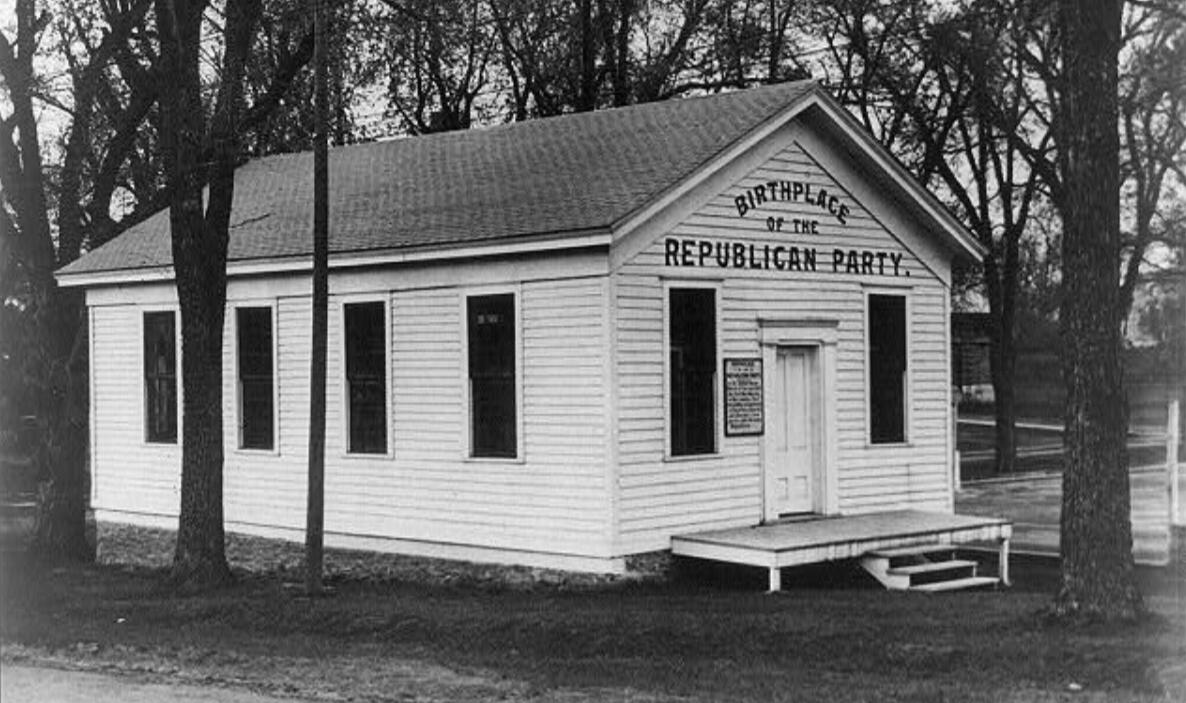
Director’s Statement
When I first heard about the events surrounding Joshua Glover, I knew it was a story that needed telling. As a history lover and lifelong storyteller, I was struck by a real-life narrative that had it all: drama, conflict, heroics, villainy, fear, sacrifice … and an unexpected twist. The protagonist was a true underdog, the antagonist a heartless scoundrel. It was an old-fashioned tale of good vs. evil, David vs. Goliath.I was moved by the plight of Glover, a fugitive slave from Missouri who found sanctuary in Racine, Wisconsin, in 1852. He escaped from a St. Louis farm, hiked nearly 400 miles with a bounty on his head and found a job at a sawmill not far from Lake Michigan. His “owner,” Benammi Garland, hired slave catchers to track him down, and by February 1854 they had accomplished their nefarious task. Garland traveled to Milwaukee and appeared before a judge to reclaim Glover under the Fugitive Slave Act of 1850.A posse that included federal marshals descended upon Glover’s home on the evening of March 10, 1854. He was playing cards with friends when Garland and the others swooped in. Glover was beaten and carted off to a Milwaukee jail, destined for a renewed life of bondage.Fortunately, the good people of Racine, Milwaukee and Waukesha got wind of the arrest and envisioned a different outcome. As word of Glover’s incarceration spread, some 5,000 people gathered outside the jail. They demanded that legal rights, like a writ of habeus corpus and a jury trial, be extended to Glover. When these demands were ignored, the mob broke down the courthouse door, overwhelmed the guards and swept Glover to a waiting carriage. They moved him about the Underground Railroad for a few weeks until they secured him safe passage on a boat to Canada. Glover was free.It was a remarkable and little-known story, but I later discovered there was more to it than I first realized. The rescue of Joshua Glover served as a catalyst for even more dramatic and historic events. It wasn’t until early 2023, when I was at an estate sale rummaging through thousands of books once owned by a retired history professor, that I came across The Rescue of Joshua Glover: A Fugitive Slave, the Constitution and the Coming of the Civil War by H. Robert Baker, an associate professor of legal and constitutional history at Georgia State University. I continued to scrounge, finding at least two dozen books on Wisconsin history, slavery in America, the abolition movement and related topics. I bought them all.As I began to read through this new collection, I discovered that the story didn’t end with Glover’s arrival on Canadian soil. Just days later, an ardent group of Wisconsinites – incensed by the Fugitive Slave Act and the Kansas-Nebraska Act – met in the tiny village of Ripon, Wisconsin, to form a new, anti-slavery political party. Disillusioned by the failure of the Whig, Democrat, Liberty and Free Soil parties to effectively counter the “slave powers,” these abolitionists called themselves Republicans.This development, coupled with later Wisconsin Supreme Court rulings in favor of those who helped rescue Glover, widened the North-South chasm further, sparking Southern talk of secession. When Republican presidential candidate Abraham Lincoln won the 1860 general election, the slave states followed through on this threat. The attack on Fort Sumter in April 1861 launched a destructive, four-year war between the states. During the course of the Civil War, Lincoln would sign the Emancipation Proclamation and a measure revoking the Fugitive Slave Act. The Reconstruction Amendments adopted after the war would ultimately end the institution of slavery in America.Liberty at Stake: The Joshua Glover Story will tell the tale of this brave man, the passionate Wisconsinites who helped secure his freedom and the nation that struggled with the aftermath.
Help us tell this story!
Donate to this project.
ENDORSEMENTS

John Ridley, Oscar-winning filmmaker
If you’re anywhere in this country and you’re an individual who’s looking for a way to bring people together, you’re going to want to support this story. (It’s) absolutely phenomenal.
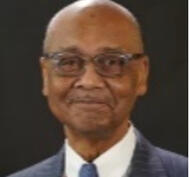
Robert Woodson, founder and president of the Woodson Center
Americans are too often presented with a distorted view of our nation’s racial history. It isn’t just a history of oppression; it's also a history of people who stood against oppression. The story of Joshua Glover is a powerful example of how an entire city came together, united by the American ideal of liberty, in order to protect a fugitive slave.Joshua’s rescue served as a catalyst for historic events that would eventually lead to slavery’s demise. It’s important that Americans, especially our young people, hear the whole story. Liberty at Stake will help paint a fuller, more unifying picture of America’s racial legacy.
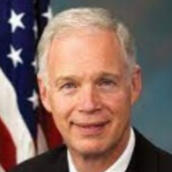
U.S. Sen. Ron Johnson
The evil of slavery should never be forgotten, nor should the fact that many Americans fought heroically to end it. The story of Joshua Glover can serve to remind us that even in the face of evil, good can and must prevail.
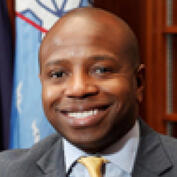
Milwaukee Mayor Cavalier Johnson
Joshua Glover’s story is important to understand because it reveals so much about our history, our morality, our laws, and our humanity. Liberty at Stake shares a valuable lesson on the cruelty and violence of American slavery and the importance of righteous people who bravely stand up to evil.

Mike Grebe, former CEO of the Bradley Foundation, former CEO of Foley & Lardner and former general counsel to the RNC
Wisconsin played a critical role in the historic events leading to the end of institutional slavery in the United States. From the public squares of Racine and Milwaukee to the Little White School House in Ripon and the State Supreme Court in Madison, the people of Wisconsin took a firm stand on behalf of Joshua Glover—and the right of every American to enjoy the fruits of liberty. This film will remind Wisconsin residents—and all Americans—of this proud legacy.

Former Speaker of the House Paul Ryan
Americans deserve stories of hope, stories of optimism, stories capturing the best of who we are as a country. The story of Joshua Glover is one that needs to be told, particularly during the Republican National Convention when the entire world is focused on Milwaukee. The birth of the Republican Party was undoubtedly set in motion by the events involving Joshua Glover and his story is an under-recognized instance of Wisconsinites playing an enormous role in shaping our nation’s politics.
Joshua Glover’s story shows how unity can triumph over division. It shows how, even when our nation was deeply divided, Wisconsinites came together as a community to do the right thing. And it shows that standing up for our principles and our fellow citizens can influence the trajectory of our country for centuries to come. I cannot wait for more people to hear this amazing story.”

Dan O’Donnell, WISN 1130 Talk Show Host
I’ve got to give credit where it is due. Where I heard this story is from a great friend of this show by the name of Michael Jahr. He has actually made a short film about Joshua Glover. It is called Liberty at Stake: The Joshua Glover Story. It’s about a 12-minute-long mini-documentary that you can actually see in its entirety at LASfilm.com.Michael tells me that he is working on a feature-length film. Production of that is currently underway. And it’s a remarkable story of resiliency, of determination, of people coming together for the common cause of freedom and liberty.

Sandy Maxx, host, 620WTMJ’s “What’s on Tap”
A compelling story with so many layers and so many themes that still resonate today. It’s absolutely fascinating.

Former Wisconsin Governor Tommy Thompson
No story better captures the compassion and fierce independence of Wisconsin Badgers than that of the fugitive slave Joshua Glover and the estimated 5,000 Wisconsinites who took action to prevent his return to bondage. Liberty at Stake will showcase the role Wisconsin played in this national drama and the shared fight for freedom and dignity — leading, ultimately, to the abolition of slavery.

Former Gov. Scott Walker
Liberty at Stake tells the story of Joshua Glover and the connection to the groundbreaking gathering of Republicans in Ripon, Wisconsin. It is the kind of history we should share with young people today.

Rebecca Kleefisch, former Wisconsin Lt. Governor
American history is much more robust and inspiring than what our young people get from today’s media and education system. While we should not attempt to scrub the blots from our past, we should be equally unwilling to overlook the bright moments that brought us together and reflected our founding ideals. The story of Joshua Glover is one of those moments where Americans, at great personal risk, lived out the values they espoused.Our nation is divided. Our young people have been taught to be suspicious of and angry toward the very country where they enjoy unequaled liberty and prosperity. Americans need to be reminded of the goodness and greatness that made the United States a beacon of light and hope for the world. As a longtime communicator and storyteller, Michael has the experience, passion and ability to bring the Joshua Glover story to life.

Eloise Anderson, administrator, Gov. Walker, Tommy Thompson administrations
The Joshua Glover story is important to tell. Americans, especially those in Wisconsin, have little to no knowledge of what so many did to advance freedom, even in defiance of federal law. Many do not know about the Fugitive Slave Laws and how Wisconsinites reeled against them. Many everyday Wisconsinites have ancestors, great grandparents, who were involved in freeing Joshua Glover.Creating a documentary about the Joshua Glover story would be impactful. It's not just about Joshua but about how a people joined in solidarity with another human being for freedom. It also would provide a needed understanding that white Wisconsinites need in order to appreciate their history in support of blacks’ humanity and freedom. And for blacks, many need to know about the actions of many Wisconsinites in Racine and Milwaukee who were instrumental in freeing Joshua.

Bradley Dunigan, social studies teacher, Milwaukee Lutheran High School
This documentary was very poignant and grabbed students’ attention. It not only was a great way to talk with students about the untold stories of African Americans in American History but is a great addition to any American History curriculum.

WNOV Radio Host Will Martin
You are making sure that Black history is recognized as American history — and that it’s not lost.

Dale Kooyenga, president, Milwaukee Metropolitan Association of Commerce
Michael Jahr did an amazing job researching and telling the Joshua Glover story (in the mini documentary). A great story by any standard, but a must see if you are interested in Milwaukee, Wisconsin and/or American history and in particular the battle for civil rights in our nation.

Jared Rosenthal, filmmaker and founder of the Madison Film Festival
Liberty at Stake stands out among the large group of films we received … Michael Jahr brings an insightful and eye-opening story to life.
UPCOMING EVENTS
Join our mail list or follow us on Facebook for the latest event announcements.
MARCH 24, 2026
A Celebration of Freedom with special guest Lynne Jackson
We hope you will join us for an unforgettable Celebration of Freedom. The event highlights the remarkable story of fugitive slave Joshua Glover and commemorates the 250th anniversary of the Declaration of Independence, which inspired his escape from slavery and his later rescue from a Milwaukee jail.Our keynote speaker will be Lynne Jackson, great-great-grandaughter of Dred Scott and founder of the Dred Scott Heritage Foundation. The goal of the foundation is to educate the public about the critical impact of the infamous Dred Scott Supreme Court decision, placing an emphasis on healing the wounds of the past.The dinner will be held at Elm Grove Woman’s Club in Elm Grove, WI. For more information and to order tickets, click here.
This event is sponsored in part byAssociate Producer
AnonymousPatrons
Bonnie and Matt Lee
Kent and Wynne LoehrkeBenefactors
Andrea and Tony Bryant
Thomas Keppeler
Gary and Joan Lato
Reggie Newson
PAST EVENTS
THURSDAY, SEPTEMBER 18, 2025
An Evening at the Museum
You have a chance to step inside one of Wisconsin’s best-kept secrets — the Abraham Lincoln/Civil War Museum in Delafield — for a night of history, storytelling and a celebration of liberty.
•Exclusive Screening: Watch a 12-minute mini-documentary about the arrest of fugitive slave Joshua Glover, the courageous and principled role Wisconsin residents’ played in his escape and how these events in Racine, Milwaukee and Ripon in March 1854 helped lead to the formation of the anti-slavery Republican Party.
•Filmmaker Q&A: Meet Michael Jahr, director and producer of Liberty at Stake: The Joshua Glover Story as he shares the vision for a full-length documentary and takes your questions.
•Special Guest Presentation: Hear from Eric Paulsen, co-host of the popular Discover Wisconsin travel series, as he shares the historical discoveries from his travels across the Badger State as a radio and television personality, writer, podcaster and producer.
MARCH 11, 2025
Mini-documentary screening hosted by Quaestsus at Concordia University
One of our main objectives is to share the Joshua Glover story with young people. So, we’re excited to be screening the mini-documentary and talking with students at Concordia University on March 11 (the date, it so happens, when Glover was rescued from the Milwaukee jail). The event begins at 6 p.m. at Pharmacy Building 008 and is open to the public. Come join us!

FEBRUARY 25, 2025
We have a unique opportunity to share the Joshua Glover story with Wisconsin legislators and their staff as part of Black History Month activities taking place in the Capitol. Liberty at Stake director/producer Michael Jahr will screen the mini-documentary for lawmakers and share the vision for a full-length film. The presentation will take place Feb. 25 and will be open to the public.
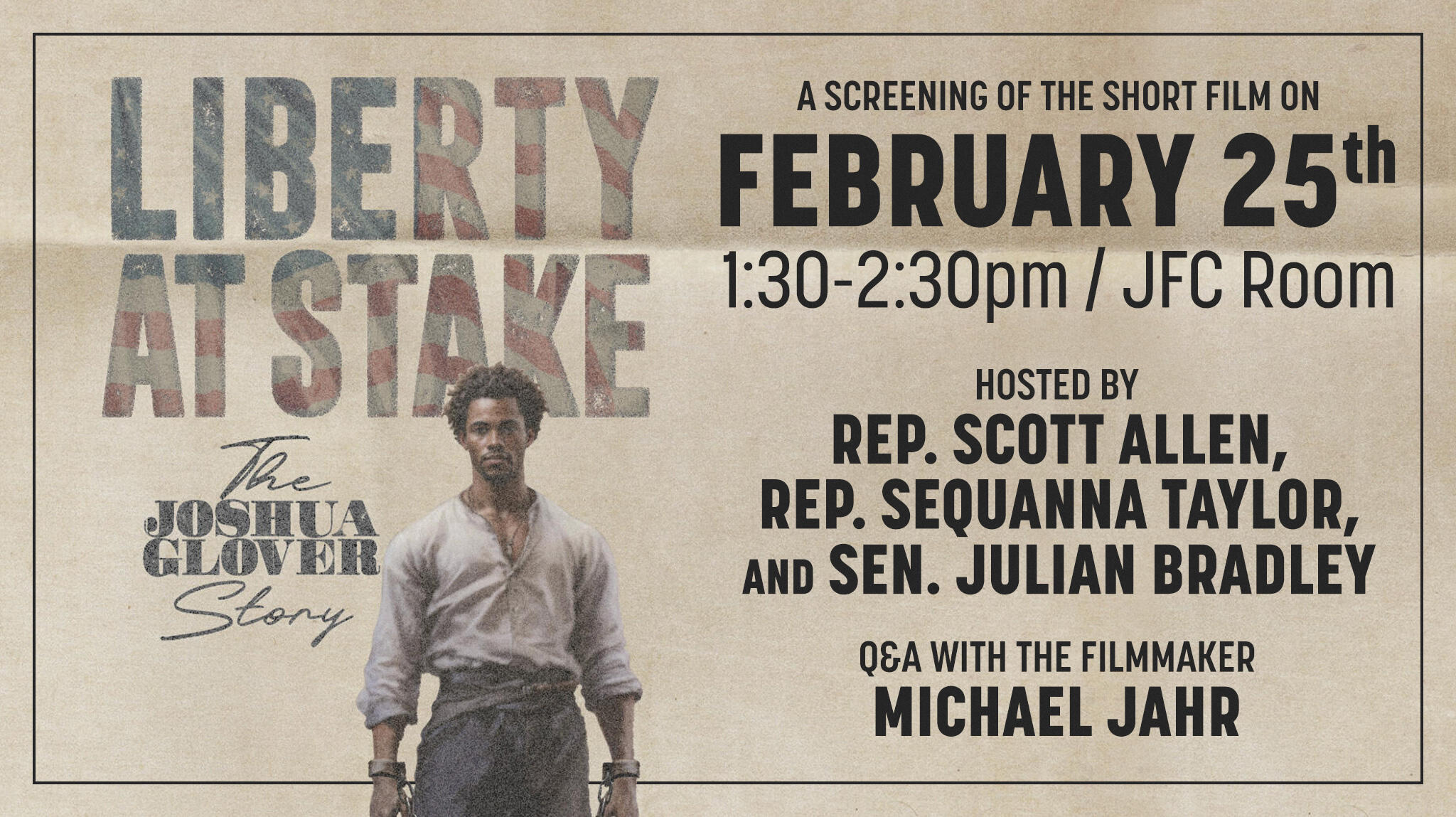
FEBRUARY 26, 2025
The Republican Party of Waukesha County “invites you to a powerful Movie Night on Wednesday, Feb. 26, at 7 p.m., as we celebrate the courage of those who shaped our nation’s history and honor one of America’s greatest presidents,” the party said in a statement sent to Wisconsin Right Now.The free double-feature consists of the “Reagan” movie starring Dennis Quaid and “Liberty at Stake: The Joshua Glover Story.”The Waukesha Co. GOP is located at W238N1700 Rockwood Dr. Suite C, Pewaukee, WI 53188.
MEDIA COVERAGE
Our American Stories
Michael Jahr and author Robert Baker share the powerful, forgotten story of fugitive slave Joshua Glover.Nō Studios
Oscar-winning filmmaker John Ridley interviews Michael Jahr as part of the Emerging Filmmaker series.American Potential The Escape That Sparked a Movement.RealClear History
A Forgotten Uprising Helped Pave the Way to Juneteenth By Michael JahrWTMJ 620 What’s on Tap
Documentarian Michael Jahr talks with Sandy Maxx about a “jaw-dropping” piece of Wisconsin history.
WTMJ Conversations with Libby Collins
Filmmaker Michael Jahr Tells the Story of Joshua Glover
National Review’s Charles C.W. Cooke Podcast
Cooke chats with Liberty at Stake director Michael Jahr about Joshua Glover’s escape, arrest and rescue, as well the abolitionist activism that led to the founding of the Republican Party.
620WTMJ Conversations
Remembering a Historical Event that Took Place in Milwaukee & Racine
TOWNHALL
Nine Days in March
In this column, Michael Jahr describes nine days in March 1854 that changed U.S. history.
WISN12
WISN 12 Anchor Gerron Jordan interviews director Michael Jahr about Joshua Glover’s story and the Liberty at Stake documentary project.
Forgotten History podcast
After a year-long hiatus, WISN talk radio host Dan O’Donnell re-launched his "Forgotten History" podcast. His topic? The Joshua Glover story.
Michael Jahr on WNOV
WNOV AM talk host Will Martin had Michael Jahr as his studio guest on Feb. 7 to discuss Joshua Glover’s escape, arrest and rescue. The Difference, an hour-long program, allowed for a deep dive into the remarkable events that took place in Wisconsin in March 1854.
Film director Michael Jahr discusses Liberty at Stake: The Joshua Glover Story.
WTMJ "Spanning the State" podcast
(Segment begins around 20:00.)
Michael Jahr on the Meg Ellefson Show
WSAU interview with Michael Jahr on Joshua Glover, the abolitionist movement and the Civil War
Liberty at Stake’ and Joshua Glover: Wisconsin’s importance to the Republican Party
Washington Times: The one issue all of the GOP could agree on: Abolishing slavery
By Scott Walker
Documentary premiere at RNC touts Glover’s lasting blow for liberty
Badger Institute: Local filmmaker links Wisconsin incident to origin of Republican Party
By Patrick McIlheran
Milwaukee’s role in the rescue of Joshua Glover
WTMJ "Spanning the State" podcast
(Segment runs from approximately 8:00 to 11:00.)
Donate to this project.
Follow our journey — as we follow Joshua’s — by signing up for our e-newsletter.
Call 262-442-5208 or write at 203 E. Wisconsin Ave. Suite 203 Oconomowoc, WI 53066Please consider a tax-deductible donation to help us get the film made, and tell this incredible story.
All images on this site are the property of their respective copyright holders.

©2026 Living Stories LLC
A documentary by Michael Jahr






